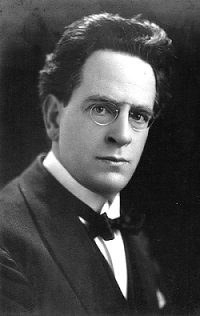
It is only within the lifetime of the
present British
Music Society that the serious music
of John Foulds began to appear on recordings.
At the beginning of the 1980s there
was produced on the Forlane label what
was for its period a remarkably adventurous
3LP set (long since deleted but reissued
on CD as Forlane UCD 16724-25 2CDs)
of orchestral music by Parry, Brian
and Foulds, with the Luxembourg Radio
Symphony Orchestra conducted by Leopold
Hager. Within the same few years there
appeared three further highly significant
LPs: the Endellion Quartet’s highly
praised recording for the Pearl label
of some of Foulds’ best music for string
quartet (an early BMS-supported project);
Peter Jacobs’ similar survey for Altarus
of Foulds’ solo piano music; and Lyrita’s
recording with Howard Shelley and the
RPO conducted by Vernon Handley of the
superb Dynamic Triptych – all
three subsequently reissued on CD and
still currently available: Pearl SHECD
9564; Altarus AIR-CD-9001; Lyrita SRCD
211, respectively.
Then, just over a decade
ago, Lyrita published a recording of
five orchestral works by Foulds with
the London Philharmonic Orchestra playing
in peak condition and conducted by Barry
Wordsworth (SRCD
212) – a recording notable above
all for its inclusion of the stunning
Three Mantras, a self-contained
suite derived from the abandoned Sanskrit
opera Avatara and consisting
of the Preludes to each of that mysterious
work’s three Acts. This viscerally exciting
piece, one of Foulds’ very best, has
in more recent years received a number
of concert performances as well as the
second recording here reviewed; but
prior to the sessions for the Lyrita
recording it had never been played,
a fate which still applies to much of
Foulds’ music.
In 1998 the list of
recordings of significant Foulds works
was further extended by the addition
to the catalogue of his impressive and
moving Cello Sonata, which appeared
in yet another world-première
recording on the British Music Society’s
own label (BMS423CD),
and proved a best-seller for its producers.
This was the piece named winner in an
early BMS competition seeking nominations
for works most urgently requiring recording
at the time.
And thus we arrive
at more recent times and the present
recording, which is described by the
composer’s son in a prefatory note in
the CD booklet as a ‘watershed’. Indeed
it is – but let us not forget its very
praiseworthy predecessors! Included
in the programme (nearly eighty minutes
in length) are two further world-première
recordings containing beautiful solo
performances from Susan Bickley (in
the Hebridean, quarter-tone infused
Lyra Celtica) and Daniel Hope
(in Apotheosis, a one-movement
evocation of late-Romantic style dedicated
to the memory of Joseph Joachim, whom
Foulds heard play with the Hallé
Orchestra which he himself joined as
a cellist in 1900), as well as a new,
and surely superior, recording of the
early Straussian tone poem Mirage
which was included in the Forlane set
(though I have not heard the latter).
As for Three Mantras,
the new performance, full of compelling
drive and momentum in the outer movements
and successfully capturing the visionary
quality of the Holstian central movement
with its additional wordless female
chorus - fresh-voiced and pure - must
now be regarded as the preferred choice
of the two currently available. But
there is not a lot in it, and I for
one retain great fondness for the LPO
performance, expertly balanced by Decca
engineers in the recording studio. The
new performance is equally well, if
slightly more distantly, recorded ‘live’
in the concert-hall (Birmingham’s Symphony
Hall); but is not the sound of the tam-tam
at the very end, as recorded or indeed
played, rather obliteratingly over-the-top,
however immediately exciting it may
be? Compare Lyrita here, with its more
integrated orchestral balance. (What
would Foulds have preferred, had he
ever heard the work performed?)
This new recording,
enterprisingly produced by Warner Classics,
is self-recommending. It will be sought
by all Foulds enthusiasts, along with
the Lyrita recording (the only duplication
of repertoire involves Three Mantras).
It also deserves more widely dispersed
distribution and appreciation among
general music lovers, and this it will
hopefully receive as news of its excellence
is broadcast.
John Talbot
see also review
by Rob Barnett a September
RECORDING OF THE
MONTH
also of interest
John
FOULDS (1880-1939)
Le Cabaret, Op. 72a (1921) [3’31].
April – England, Op. 48 No. 1.
Hellas, A Suite of Ancient Greece, Op.
45 (1932) [18’03]. Three Mantras,
Op. 61b (1919-1930) [25’49]. London
Philharmonic Orchestra/Barry Wordsworth.
No rec. information given. DDD LYRITA
SRCD212 [61’07] [CC]
A
remarkable disc, and an essential introduction
to a composer whose music cries out
for greater recognition … For the
Mantras alone, this disc deserves the
highest recommendation possible.
Ralph
VAUGHAN WILLIAMS (1872-1958)
Piano Concerto in C (1926-33 with revised
1946 ending) [27’45]. John FOULDS
(1880-1939) Dynamic Triptych, Op. 88
(1929) [29’16]. Howard Shelley
(piano); Royal Philharmonic Orchestra/Vernon
Handley. No rec. info. DDD LYRITA RECORDED
EDITION SRCD211 [57’05]
If
you are buying this for the Vaughan
Williams, you will not be disappointed.
And you may just find your mouth agape
at the marvels of the Foulds.
JOHN FOULDS
(1880-1939) Works for string
quartet Quartetto Intimo (1935)
32.32 Quartetto Geniale
(1935) 7.33 Aquarelles (1921)
12.51 Endellion Quartet rec St Peter's, Notting
Hill Gate, 25/26 July 1981
Endellion Quartet rec St Peter's, Notting
Hill Gate, 25/26 July 1981 PEARL SHE CD 9564 [53.39] [RB]
PEARL SHE CD 9564 [53.39] [RB]
Do
not forget this simply superb Foulds
disc. Foulds captured in all his dangerous
and tumultuously inventive lyricism.
JOHN
FOULDS by Malcolm Macdonald - a
pre-concert talk
Concert
review Foulds, Prokofiev, Stravinsky;
Akiko Suwanai (violin) Leon McCawley
(piano), City of Birmingham Symphony
Orchestra, Sakari Oramo, Symphony Hall,
Birmingham, 10th February 2004 (CT)
Concert
Review Richard Strauss and John
Foulds, CBSO/Sakari Oramo, Symphony
Hall, Birmingham, Wednesday 25 February
2004 (RB)

